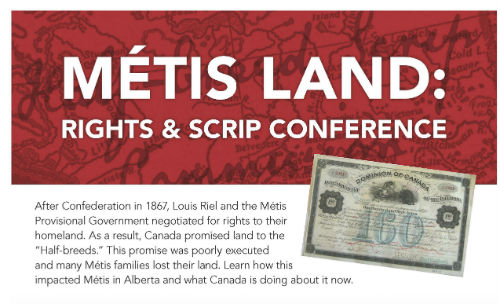
The Supreme Court of Canada has said in R. v. Blais, 2003 that "the history of scrip speculation and devaluation is a sorry chapter in our nation's history."
Next week's conference, Métis Land: Rights & Scrip, hosted by the Rupertsland Centre for Métis Research (RCMR) in collaboration with the Métis Nation of Alberta (MNA) and the Rupertsland Institute, will explore how scrip impacted Métis in Alberta and what Canada is doing to address the legacy of the scrip system.
"The goal of the conference is to learn about this policy and the ways in which it affected the Métis people in Alberta and what the Métis Nation and Canada are doing about it now," said Nathalie Kermoal, director of the RCMR and the Faculty of Native Studies' associate dean academic.
Following Confederation in 1867, westward expansion became one of Canada's primary goals. Fearing their rights to the land would not be respected, Louis Riel and the Métis Provisional Government negotiated for rights to their homeland. As a result, when Canada was acquiring Rupertsland in 1870, it made promises to the Métis people. 1.4 million acres of land was to be set aside for the "Half-breed" children born prior to July 15, 1870 in the original province of Manitoba.Each child was to receive the equivalent of 240 acres of land and the head of household was to receive the equivalent of $160 in scrip.
"No reconciliation is possible if the history of Métis lands and scrip is not known." - Nathalie Kermoal
Instead, Canada failed to implement this policy diligently and few Métis actually benefited from it. The scrip process was complex and disorganized, making it difficult for Métis people to acquire land and created room for fraud. For years, the Métis had nowhere to turn for restitution.
For Métis in Alberta, that changed on November 16, 2017, when the Métis Nation of Alberta and the Government of Canada signed the Framework Agreement for Advancing Reconciliation. The agreement acknowledges the need to address the injustices suffered by the Métis Nation as a result of the scrip system and declares a shared goal to develop a solution promoting reconciliation between the Métis Nation of Alberta and Canada.
"We hope attendees will leave the conference with a better understanding of scrip and the issues at stake, especially as one starts to recognize the injustices suffered," Kermoal said.
Métis scrip in Alberta
The RCMR is an academic research centre that focuses on Métis issues. In 2018 the centre, with support from the Métis Archival Project (MAP) Laboratory and the Métis Nation of Alberta legal counsel, created the booklet Métis Scrip in Alberta. The project is a compilation of information providing a basic overview of scrip and the ways it has affected the Métis Nation. By following the experiences of one woman from Lac La Biche navigating the official process of applying for and receiving scrip, the reader learns of the challenges that Métis families and individuals faced.
The Métis Scrip in Alberta booklet was a preliminary introduction to scrip, and a lead up to the Métis Land: Rights & Scrip Conference.
"At the heart of the RCMR is a mandate to engage in Métis historical research and research related to Métis rights," explained Kermoal. "This conference is in line with that mandate, and enables us to share that research with the community."
The upcoming conference features a keynote from Frank Tough, director of the Métis Archival Project and professor in the Faculty of Native Studies; a presentation by MNA president Audrey Poitras; and panels focused around the history of Métis lands in Alberta and legal claims, both national and provincial. The conference will also feature a talking circle with knowledge keepers.
Kermoal sees the conference as being of value to all Albertans, not only those with Métis heritage.
"This is a very important chapter of Alberta's history, and no reconciliation is possible if the history of Métis lands and scrip is not known."
The Métis Land: Rights & Scrip Conference is February 8 & 9, 2019 at the Lister Conference Centre at the University of Alberta. If you are unable to attend in person, you are welcome to watch and participate with the livestream, hosted on the Métis Nation of Alberta Facebook Live page.